2015 NISSAN XTERRA ad blue
[x] Cancel search: ad bluePage 5 of 396
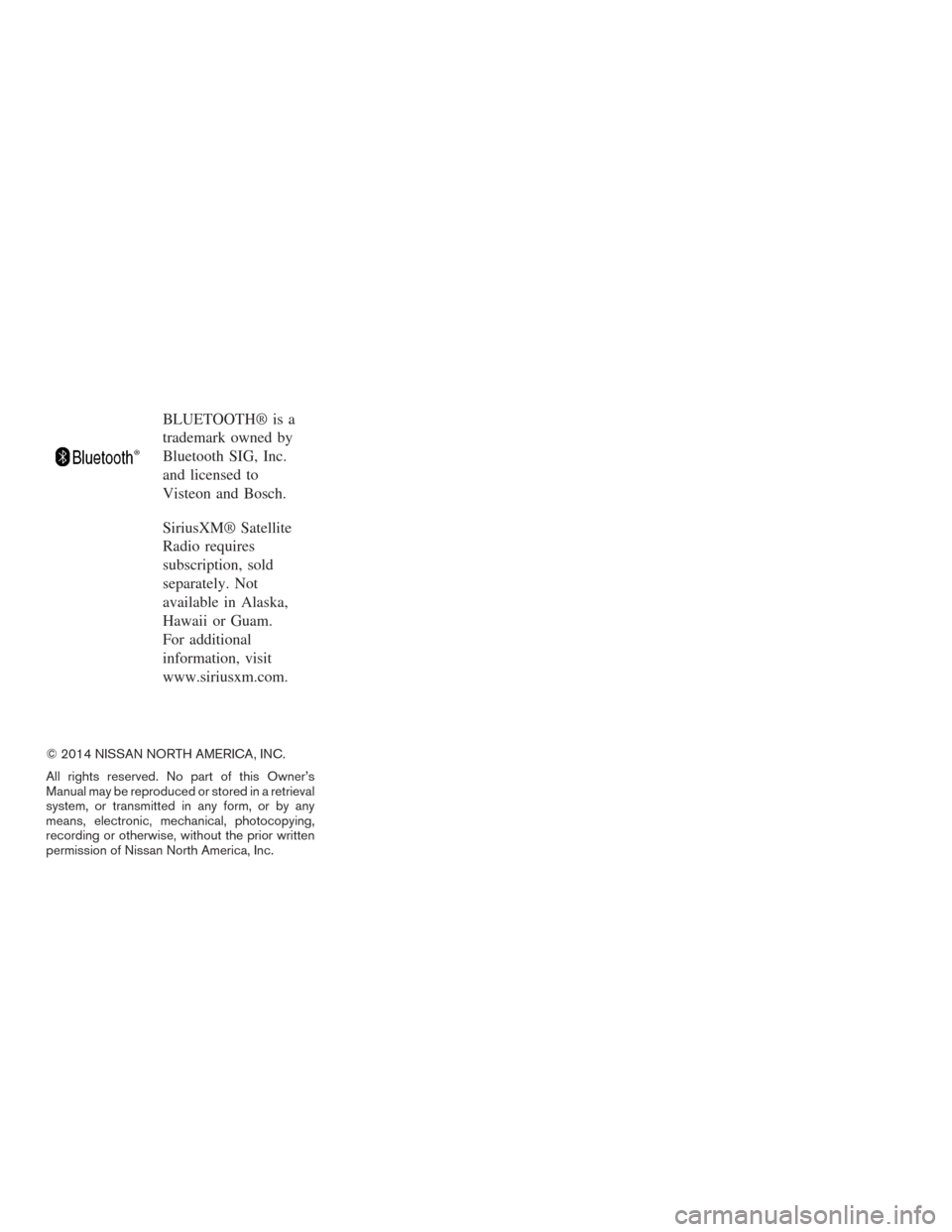
BLUETOOTH® is a
trademark owned by
Bluetooth SIG, Inc.
and licensed to
Visteon and Bosch.
SiriusXM® Satellite
Radio requires
subscription, sold
separately. Not
available in Alaska,
Hawaii or Guam.
For additional
information, visit
www.siriusxm.com.
© 2014 NISSAN NORTH AMERICA, INC.
All rights reserved. No part of this Owner’s
Manual may be reproduced or stored in a retrieval
system, or transmitted in any form, or by any
means, electronic, mechanical, photocopying,
recording or otherwise, without the prior written
permission of Nissan North America, Inc.
Page 15 of 396
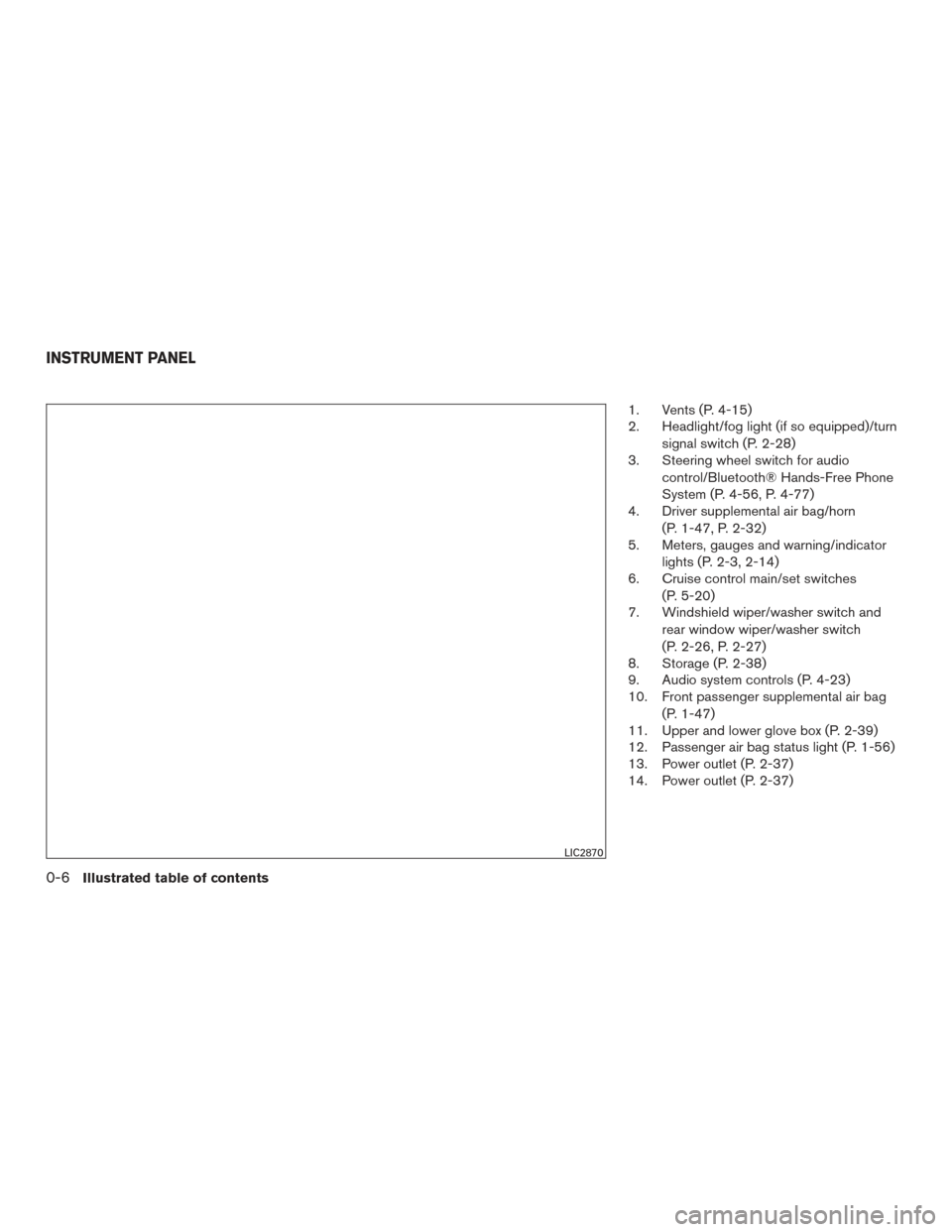
1. Vents (P. 4-15)
2. Headlight/fog light (if so equipped)/turnsignal switch (P. 2-28)
3. Steering wheel switch for audio
control/Bluetooth® Hands-Free Phone
System (P. 4-56, P. 4-77)
4. Driver supplemental air bag/horn
(P. 1-47, P. 2-32)
5. Meters, gauges and warning/indicator
lights (P. 2-3, 2-14)
6. Cruise control main/set switches
(P. 5-20)
7. Windshield wiper/washer switch and
rear window wiper/washer switch
(P. 2-26, P. 2-27)
8. Storage (P. 2-38)
9. Audio system controls (P. 4-23)
10. Front passenger supplemental air bag
(P. 1-47)
11. Upper and lower glove box (P. 2-39)
12. Passenger air bag status light (P. 1-56)
13. Power outlet (P. 2-37)
14. Power outlet (P. 2-37)
LIC2870
INSTRUMENT PANEL
0-6Illustrated table of contents
Page 19 of 396
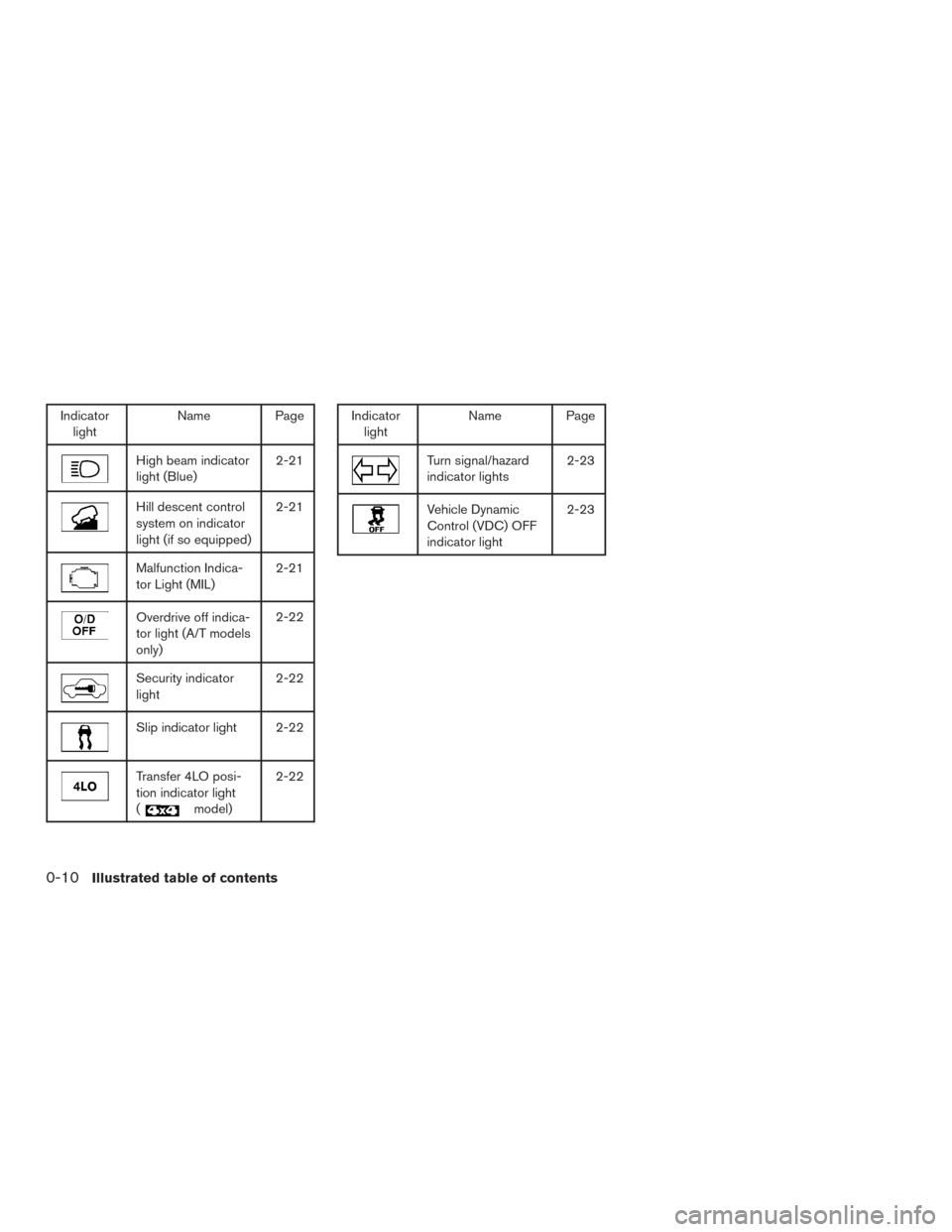
Indicatorlight Name Page
High beam indicator
light (Blue) 2-21
Hill descent control
system on indicator
light (if so equipped)2-21
Malfunction Indica-
tor Light (MIL)
2-21
Overdrive off indica-
tor light (A/T models
only)2-22
Security indicator
light
2-22
Slip indicator light 2-22
Transfer 4LO posi-
tion indicator light
(
model)2-22
Indicator
light Name Page
Turn signal/hazard
indicator lights 2-23
Vehicle Dynamic
Control (VDC) OFF
indicator light2-23
0-10Illustrated table of contents
Page 85 of 396
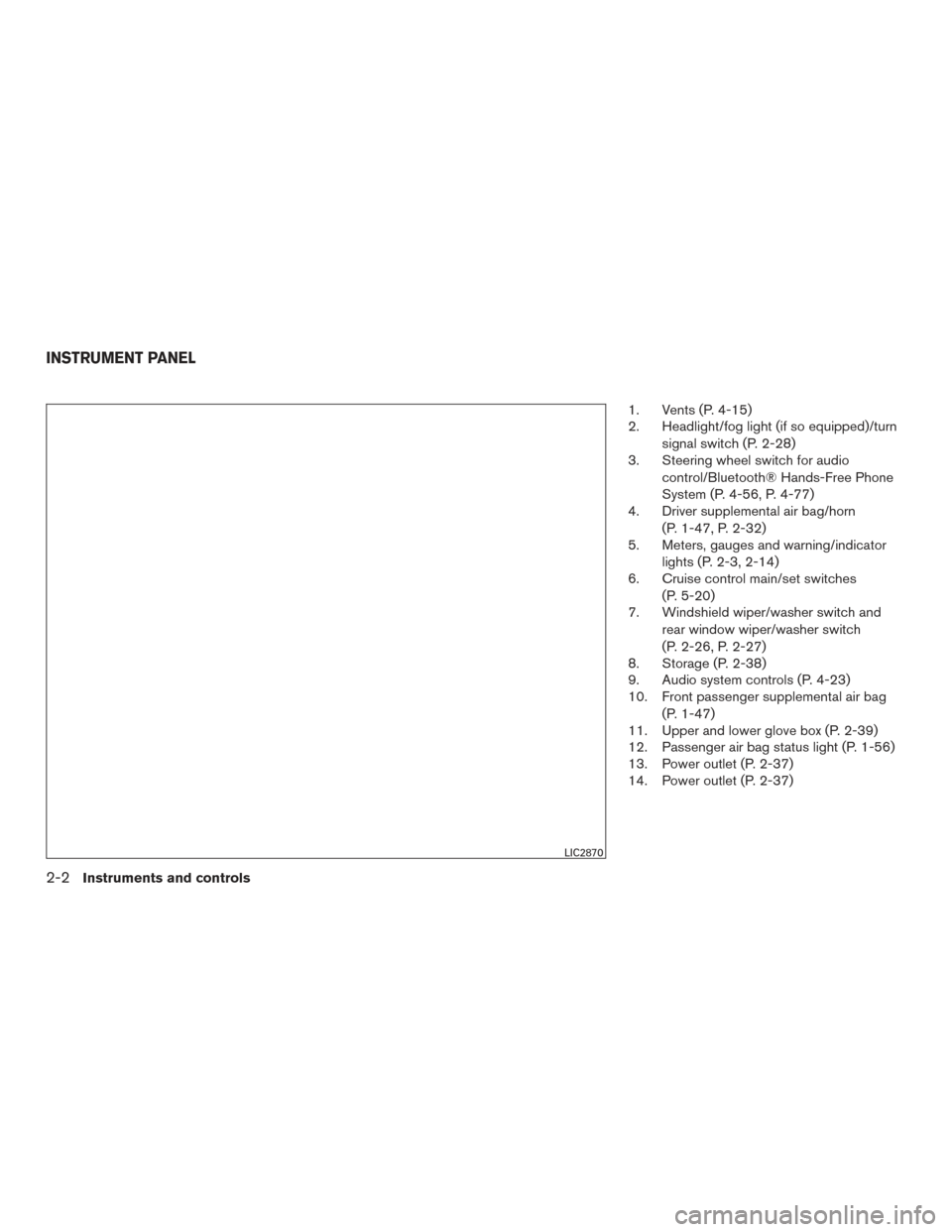
1. Vents (P. 4-15)
2. Headlight/fog light (if so equipped)/turnsignal switch (P. 2-28)
3. Steering wheel switch for audio
control/Bluetooth® Hands-Free Phone
System (P. 4-56, P. 4-77)
4. Driver supplemental air bag/horn
(P. 1-47, P. 2-32)
5. Meters, gauges and warning/indicator
lights (P. 2-3, 2-14)
6. Cruise control main/set switches
(P. 5-20)
7. Windshield wiper/washer switch and
rear window wiper/washer switch
(P. 2-26, P. 2-27)
8. Storage (P. 2-38)
9. Audio system controls (P. 4-23)
10. Front passenger supplemental air bag
(P. 1-47)
11. Upper and lower glove box (P. 2-39)
12. Passenger air bag status light (P. 1-56)
13. Power outlet (P. 2-37)
14. Power outlet (P. 2-37)
LIC2870
INSTRUMENT PANEL
2-2Instruments and controls
Page 97 of 396
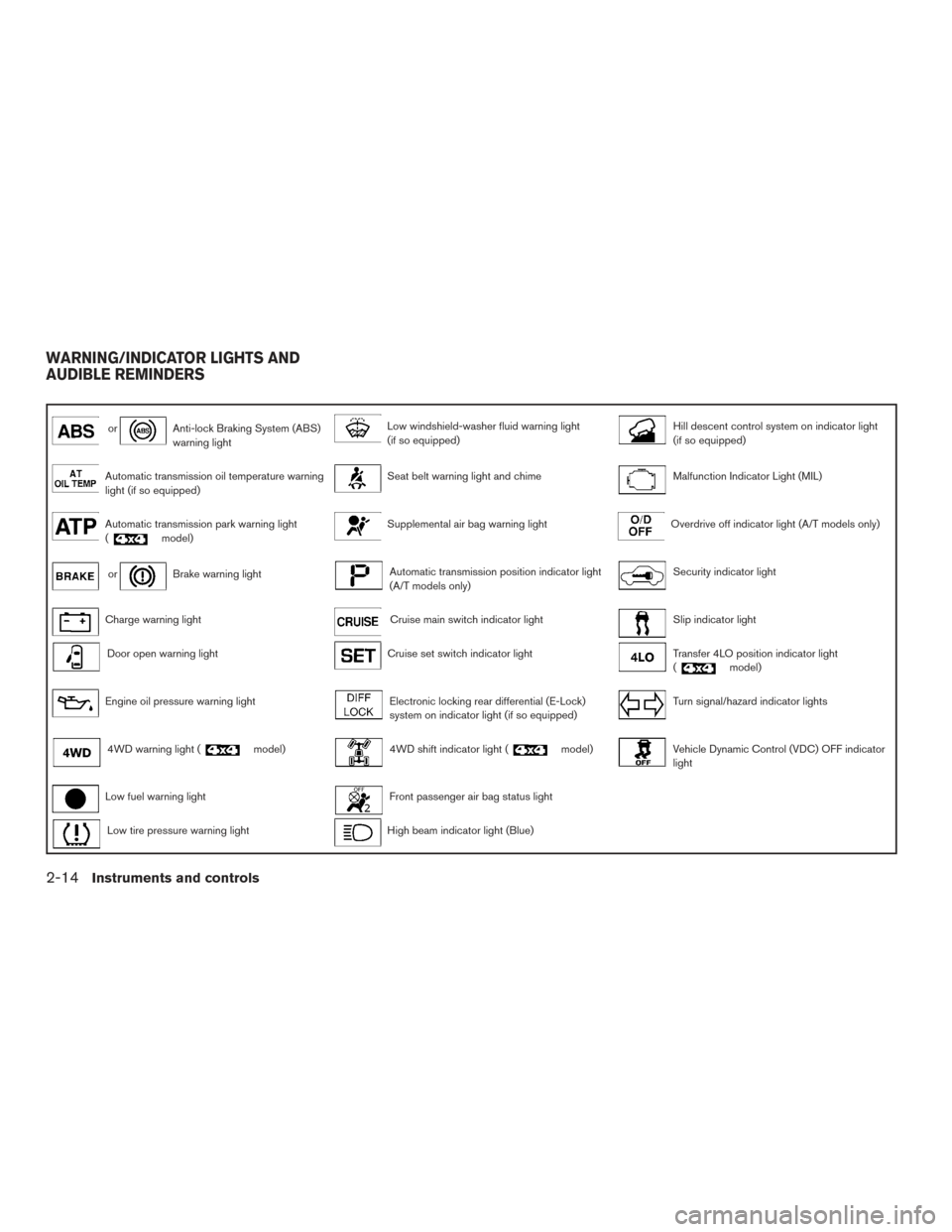
orAnti-lock Braking System (ABS)
warning lightLow windshield-washer fluid warning light
(if so equipped)Hill descent control system on indicator light
(if so equipped)
Automatic transmission oil temperature warning
light (if so equipped)Seat belt warning light and chimeMalfunction Indicator Light (MIL)
Automatic transmission park warning light
(model)Supplemental air bag warning lightOverdrive off indicator light (A/T models only)
orBrake warning lightAutomatic transmission position indicator light
(A/T models only)Security indicator light
Charge warning lightCruise main switch indicator lightSlip indicator light
Door open warning lightCruise set switch indicator lightTransfer 4LO position indicator light
(model)
Engine oil pressure warning lightElectronic locking rear differential (E-Lock)
system on indicator light (if so equipped)Turn signal/hazard indicator lights
4WD warning light (model)4WD shift indicator light (model)Vehicle Dynamic Control (VDC) OFF indicator
light
Low fuel warning lightFront passenger air bag status light
Low tire pressure warning lightHigh beam indicator light (Blue)
WARNING/INDICATOR LIGHTS AND
AUDIBLE REMINDERS
2-14Instruments and controls
Page 104 of 396
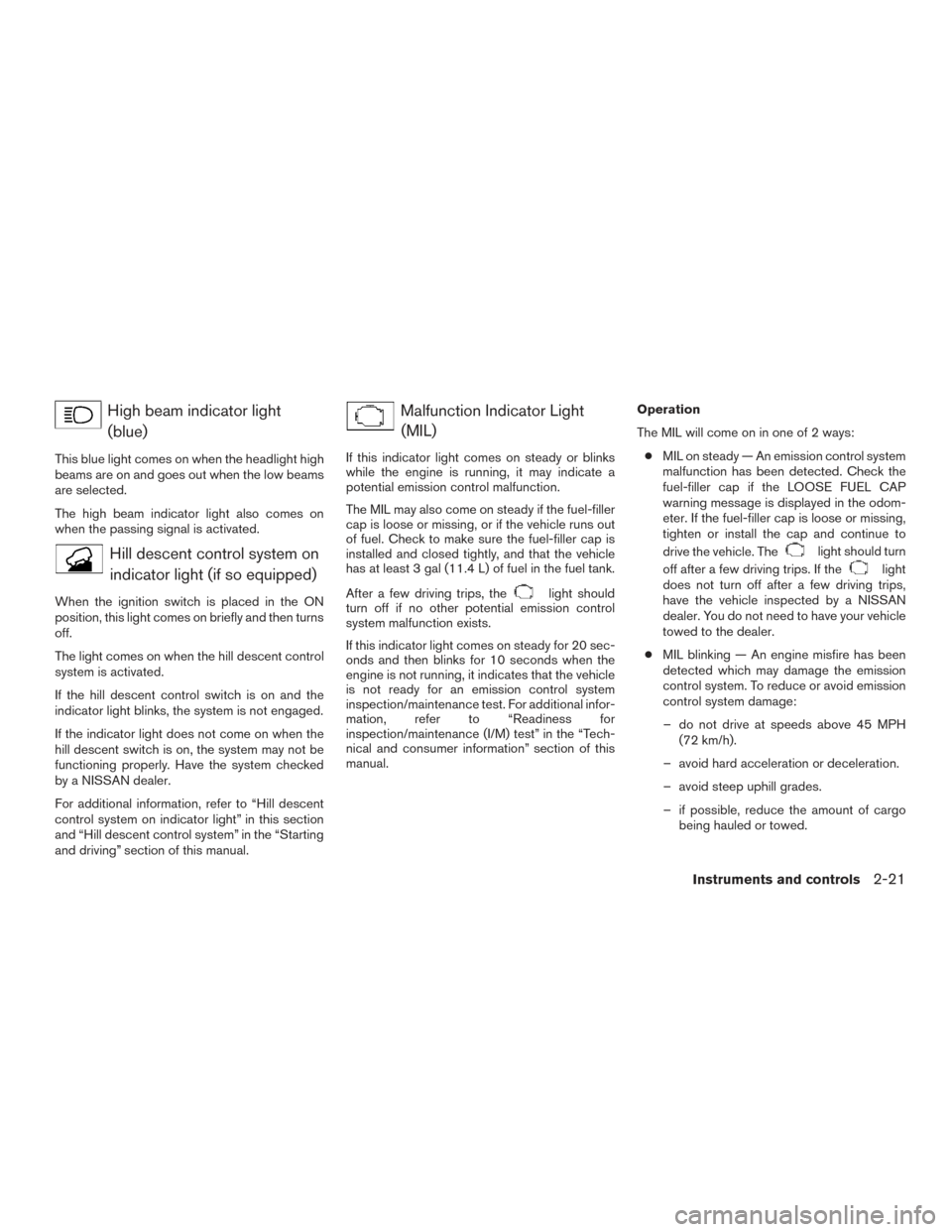
High beam indicator light(blue)
This blue light comes on when the headlight high
beams are on and goes out when the low beams
are selected.
The high beam indicator light also comes on
when the passing signal is activated.
Hill descent control system onindicator light (if so equipped)
When the ignition switch is placed in the ON
position, this light comes on briefly and then turns
off.
The light comes on when the hill descent control
system is activated.
If the hill descent control switch is on and the
indicator light blinks, the system is not engaged.
If the indicator light does not come on when the
hill descent switch is on, the system may not be
functioning properly. Have the system checked
by a NISSAN dealer.
For additional information, refer to “Hill descent
control system on indicator light” in this section
and “Hill descent control system” in the “Starting
and driving” section of this manual.
Malfunction Indicator Light(MIL)
If this indicator light comes on steady or blinks
while the engine is running, it may indicate a
potential emission control malfunction.
The MIL may also come on steady if the fuel-filler
cap is loose or missing, or if the vehicle runs out
of fuel. Check to make sure the fuel-filler cap is
installed and closed tightly, and that the vehicle
has at least 3 gal (11.4 L) of fuel in the fuel tank.
After a few driving trips, the
light should
turn off if no other potential emission control
system malfunction exists.
If this indicator light comes on steady for 20 sec-
onds and then blinks for 10 seconds when the
engine is not running, it indicates that the vehicle
is not ready for an emission control system
inspection/maintenance test. For additional infor-
mation, refer to “Readiness for
inspection/maintenance (I/M) test” in the “Tech-
nical and consumer information” section of this
manual. Operation
The MIL will come on in one of 2 ways:
● MIL on steady — An emission control system
malfunction has been detected. Check the
fuel-filler cap if the LOOSE FUEL CAP
warning message is displayed in the odom-
eter. If the fuel-filler cap is loose or missing,
tighten or install the cap and continue to
drive the vehicle. The
light should turn
off after a few driving trips. If the
light
does not turn off after a few driving trips,
have the vehicle inspected by a NISSAN
dealer. You do not need to have your vehicle
towed to the dealer.
● MIL blinking — An engine misfire has been
detected which may damage the emission
control system. To reduce or avoid emission
control system damage:
– do not drive at speeds above 45 MPH (72 km/h).
– avoid hard acceleration or deceleration.
– avoid steep uphill grades.
– if possible, reduce the amount of cargo being hauled or towed.
Instruments and controls2-21
Page 152 of 396
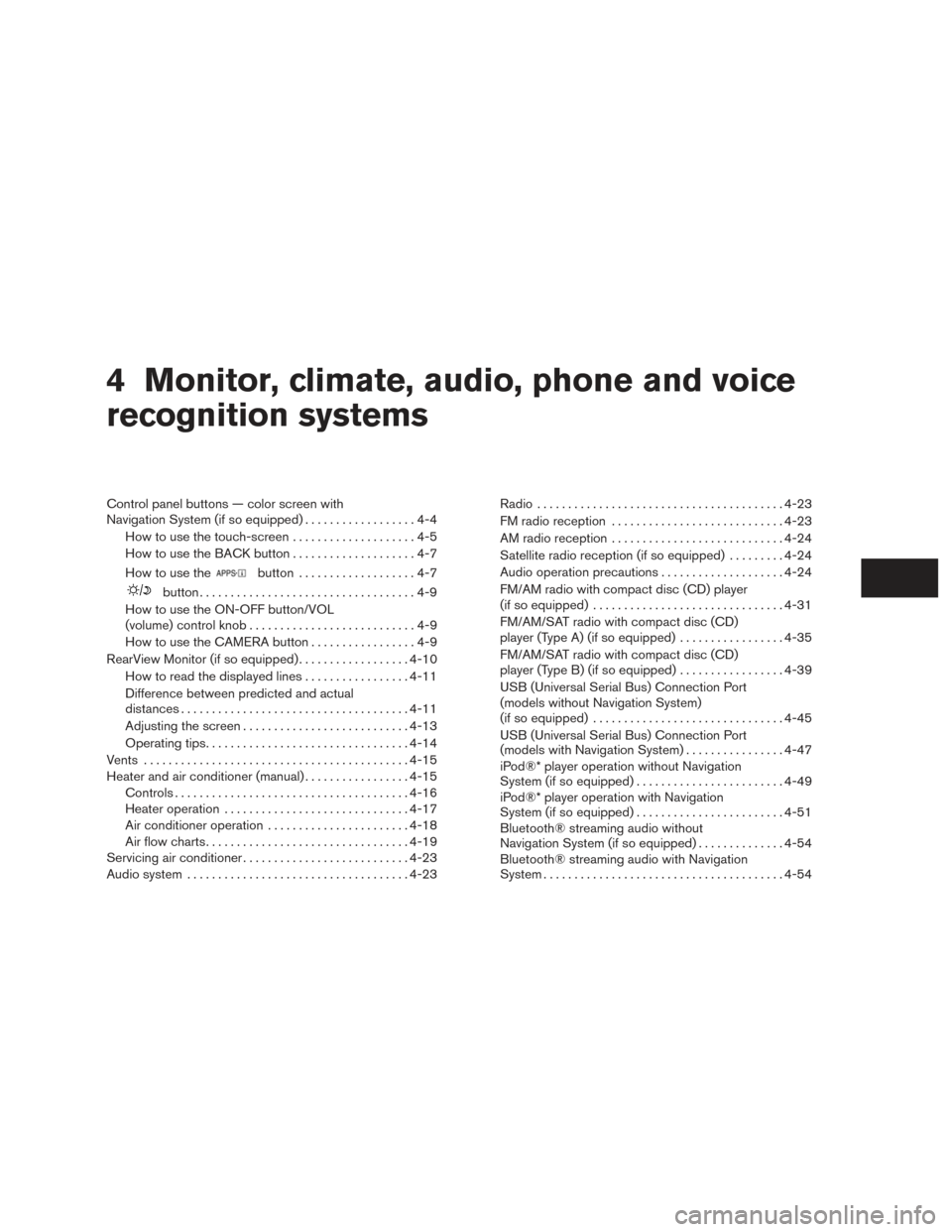
4 Monitor, climate, audio, phone and voice
recognition systems
Control panel buttons — color screen with
Navigation System (if so equipped)..................4-4
How to use the touch-screen . . ..................4-5
How to use the BACK button ....................4-7
How to use the
button ...................4-7
button...................................4-9
How to use the ON-OFF button/VOL
(volume) control knob ...........................4-9
How to use the CAMERA button .................4-9
RearView Monitor (if so equipped) ..................4-10
How to read the displayed lines .................4-11
Difference between predicted and actual
distances ..................................... 4-11
Adjusting the screen ........................... 4-13
Operating tips ................................. 4-14
Vents ........................................... 4-15
Heater and air conditioner (manual) .................4-15
Controls ...................................... 4-16
Heater operation .............................. 4-17
Air conditioner operation .......................4-18
Air flow charts ................................. 4-19
Servicing air conditioner ........................... 4-23
Audio system .................................... 4-23Radio
........................................ 4-23
FM radio reception ............................ 4-23
AM radio reception ............................ 4-24
Satellite radio reception (if so equipped) .........4-24
Audio operation precautions ....................4-24
FM/AM radio with compact disc (CD) player
(if so equipped) ............................... 4-31
FM/AM/SAT radio with compact disc (CD)
player (Type A) (if so equipped) .................4-35
FM/AM/SAT radio with compact disc (CD)
player (Type B) (if so equipped) .................4-39
USB (Universal Serial Bus) Connection Port
(models without Navigation System)
(if so equipped) ............................... 4-45
USB (Universal Serial Bus) Connection Port
(models with Navigation System) ................4-47
iPod®* player operation without Navigation
System (if so equipped) ........................ 4-49
iPod®* player operation with Navigation
System (if so equipped) ........................ 4-51
Bluetooth® streaming audio without
Navigation System (if so equipped) ..............4-54
Bluetooth® streaming audio with Navigation
System ....................................... 4-54
Page 153 of 396
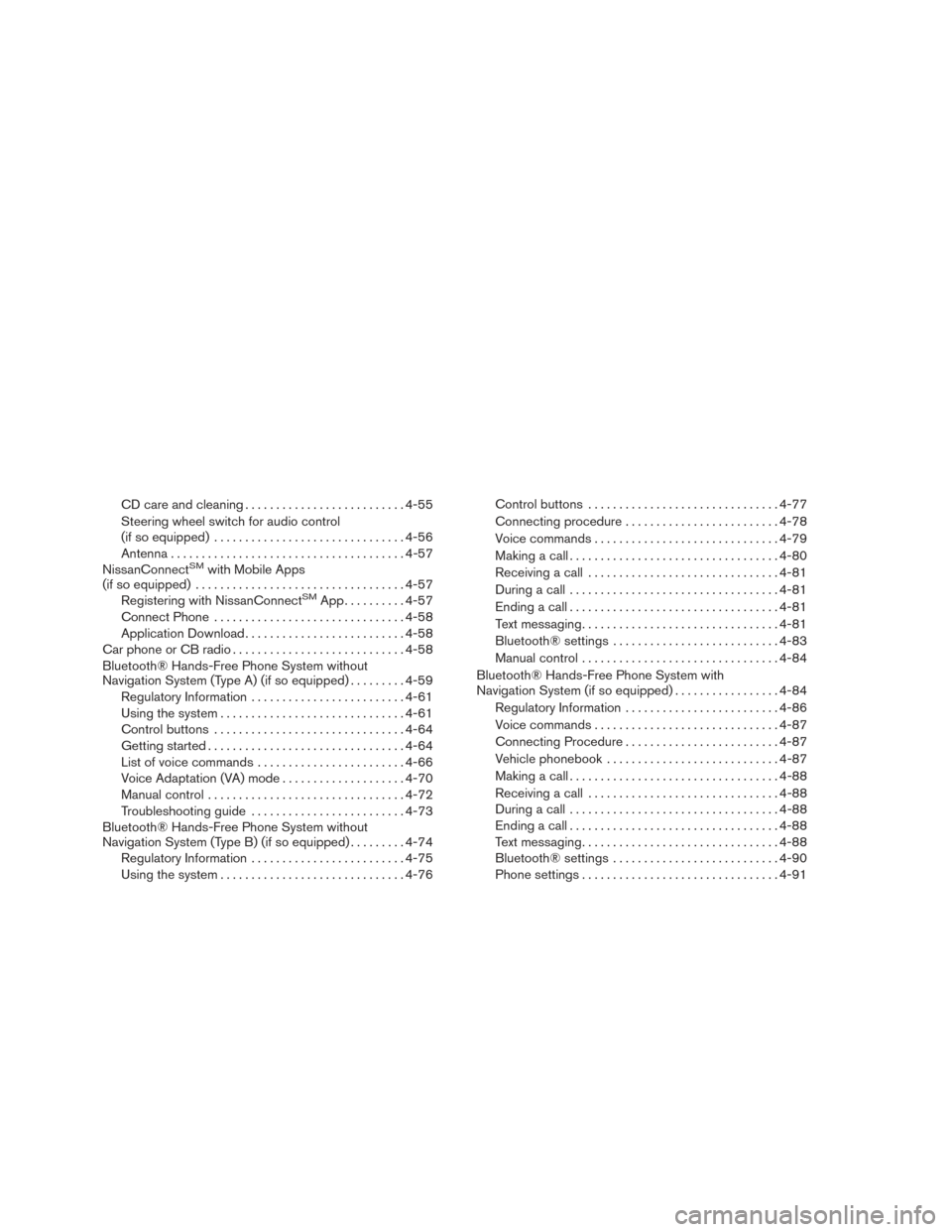
CD care and cleaning.......................... 4-55
Steering wheel switch for audio control
(if so equipped) ............................... 4-56
Antenna ...................................... 4-57
NissanConnect
SMwith Mobile Apps
(if so equipped) .................................. 4-57
Registering with NissanConnect
SMApp.......... 4-57
Connect Phone ............................... 4-58
Application Download .......................... 4-58
Car phone or CB radio ............................ 4-58
Bluetooth® Hands-Free Phone System without
Navigation System (Type A) (if so equipped) .........4-59
Regulatory Information ......................... 4-61
Using the system .............................. 4-61
Control buttons ............................... 4-64
Getting started ................................ 4-64
List of voice commands ........................ 4-66
Voice Adaptation (VA) mode ....................4-70
Manual control ................................ 4-72
Troubleshooting guide ......................... 4-73
Bluetooth® Hands-Free Phone System without
Navigation System (Type B) (if so equipped) .........4-74
Regulatory Information ......................... 4-75
Using the system .............................. 4-76Control buttons
............................... 4-77
Connecting procedure ......................... 4-78
Voice commands .............................. 4-79
Making a call . ................................. 4-80
Receiving a call ............................... 4-81
During a call .................................. 4-81
Ending a call .................................. 4-81
Text messaging. . .............................. 4-81
Bluetooth® settings ........................... 4-83
Manual control . . .............................. 4-84
Bluetooth® Hands-Free Phone System with
Navigation System (if so equipped) .................4-84
Regulatory Information ......................... 4-86
Voice commands .............................. 4-87
Connecting Procedure ......................... 4-87
Vehicle phonebook ............................ 4-87
Making a call . ................................. 4-88
Receiving a call ............................... 4-88
During a call .................................. 4-88
Ending
a call.................................. 4-88
Text messaging. . .............................. 4-88
Bluetooth® settings ........................... 4-90
Phone settings ................................ 4-91